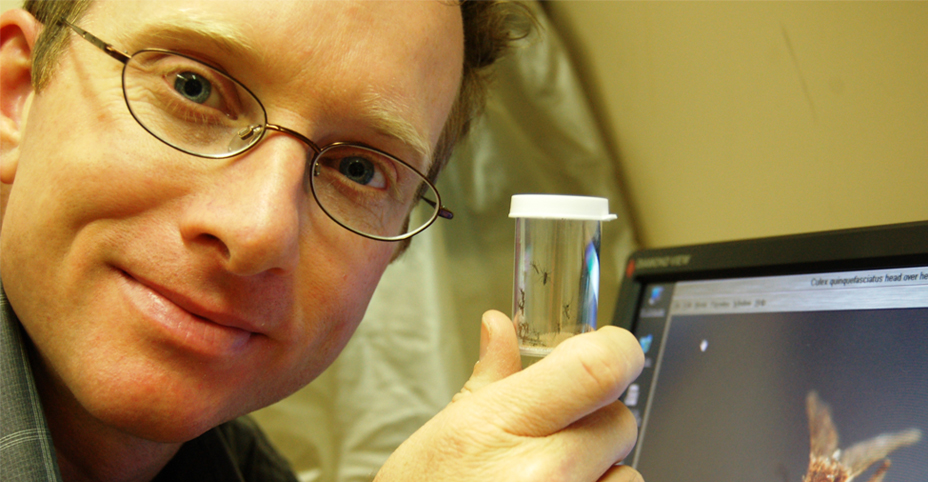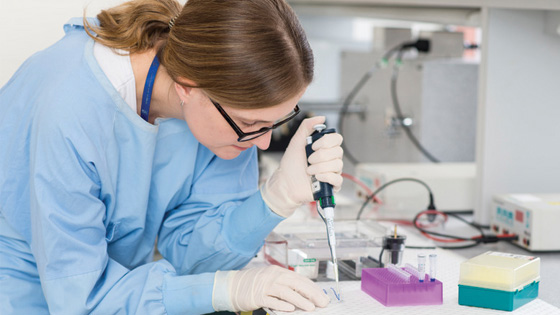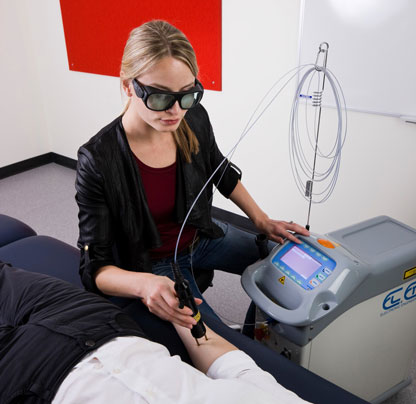
Associate Professor Craig Williams, alumnus and leader of the Healthy Environments, Healthy People Research Group at the Sansom Institute
They have a notorious reputation as disease-spreading, blood-sucking pests, but UniSA researchers have developed a new ‘spit test’ using mosquito saliva that could be the key to preventing disease. This ground-breaking research is vital considering the mosquito-borne Zika virus is fast becoming an urgent global health priority.
Associate Professor Craig Williams has made a career of studying mosquito behaviour and understanding the interaction between environment and human health. With a PhD in Biomedical Science from the University of South Australia, he studies mosquito-borne disease and works to detect viruses that infect people and animals, with the aim of developing early preventative warning systems.
Mosquitoes have long been tested for traces of viruses but existing technologies provide limited insight into disease ecology. Additionally, the mass collection and shipment of live mosquitoes to labs to be analysed is expensive and leaves much left to be discovered. After colleagues in Queensland discovered that mosquito saliva allows for easier detection of viruses than searching for traces in their gut, Assoc Prof Williams and his Group have begun using novel technology to capture and test mosquito saliva in the environment.
Specially coated cards that preserve virus genes are coated in honey and used to attract mosquitoes to feed. While eating the honey the mosquito spits onto the card, leaving behind traces of any potential virus. While previous tests required thousands of mosquitoes to be captured, shipped and analysed, only to find the majority were not disease carriers, these cards only identify dangerous mosquitoes with viruses in their saliva. Thousands of mosquitoes can spit onto a single card, and as the cards can be shipped to laboratories without refrigeration, the testing process is time-saving and less expensive.
“We made over 20 different virus detections in Adelaide alone in 2014 using this technology, so we’re looking to expand the system to detect other viruses that may be affecting wildlife, livestock and people,” says Assoc Prof Williams.
“We’ve shown it can work, and while the spit tests currently detect known viruses, there’s potential to look for unknown exotic viruses from overseas to stop them reaching Australia".
The timing of this ground-breaking research is paramount considering the outbreak of the Zika virus in Brazil in 2015. An alarming development from the Zika virus is the strong association with microcephaly, a birth deformity linked with women who have had Zika infection. Assoc Prof Williams’ colleague, Associate Professor John Hayball, and his team at UniSA are currently working with a Melbourne-based biotech company to develop a vaccine for the Zika virus.
One of the researchers in Assoc Prof Williams’ Group is PhD student Emily Johnston who “was really a driver for the development and obtained valuable research out in the field,” Assoc Prof Williams says.
Emily presented her findings at UniSA’s Three Minute Thesis and won the competition and the People’s Choice Award. Three Minute Thesis is a competition which challenges the University's top PhD students to present their thesis topic in only three minutes. You can watch Emily’s winning presentation here.
Assoc Prof Williams hopes that this breakthrough in virus detection technology may one day extend to other animals as well as mosquitoes, such as domestic pets, feral cats and bats, to develop virus surveillance tools to protect pets and humans.
“The primary goal is to reduce human and livestock disease burden. If we can detect viruses promptly that gives us an early warning system to develop preventative methods with medical professionals and farmers.”

100% of your gift will go directly to support health research at UniSA - there are no administration fees, no overheads and no hidden costs.
Support our researchers continue their work in preventing illness, improving health systems and services, creating more effective therapies, and advancing health equality.
